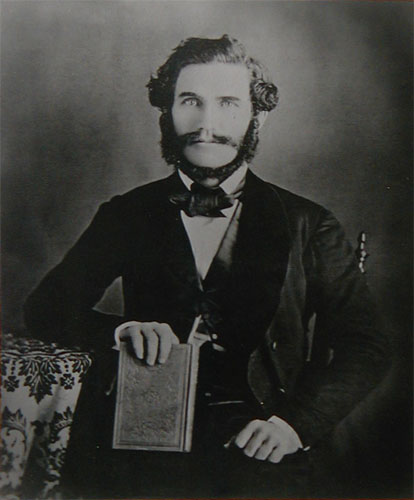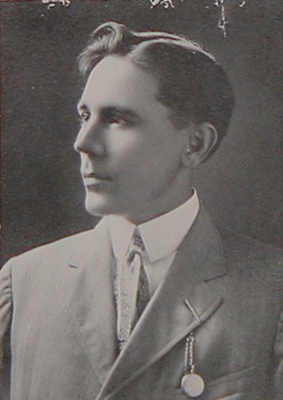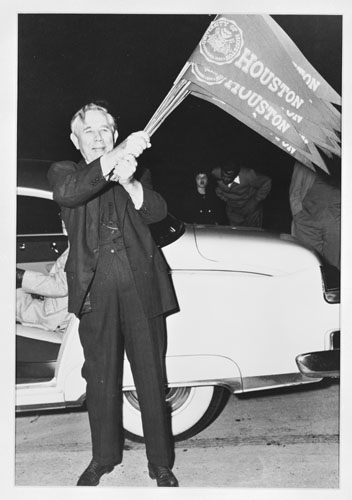The Founders
HUGH ROY CULLEN (July 3, 1881 – July 4, 1957)
Born in Denton County, Texas, July 3, 1881, to Cicero and Louise Beck Cullen, Hugh Roy Cullen was the grandson of Ezekiel Wimberly Cullen. Ezekiel had come from Georgia to Texas in 1835 seeking fame and fortune and had fought in the early days of the revolution against Mexico. Eventually he settled in San Augustine, the seat of the new revolutionary government. There he contributed to the formative growth of the new state as a judge as well as a state senator, in which capacity he authored a bill that established the educational system of the State of Texas.
Raised by his mother in the frontier town of San Antonio, Hugh Roy Cullen was forced to grow up in a hurry. He attended public school only through the fifth grade. At the age of 12 he went to work sacking candy at three dollars a week while continuing self-directed studies at night. In 1897, at the age of 17, he moved to Schulenburg to enter the cotton business, operating as a buyer and factor in both Texas and the Oklahoma Territory. There he met Lillie Cranz, daughter of a successful rancher and merchant. They were married five years later when Lillie turned 21. Lillie became his staunchest supporter and lifelong partner, later sharing in the planning and execution of their many philanthropies. Together they enjoyed 54 years of marriage and were blessed with five children. Their only son Roy Gustav Cullen was born in 1905 and later four daughters followed: Lillie, Agnes, Margaret, and Wilhelmina.
Having developed a successful career in the cotton business, as well as a reputation for hard work, tenacity and integrity, Roy Cullen moved his family to Houston in 1911. There he continued his cotton business and began to invest in real estate until he became interested in the newly emerging oil industry. Very quickly, Cullen found himself deeply immersed in the business and political life of his adopted city. Cullen discovered his first producing oil field in 1921. In 1928, he teamed up with wildcatter Jim West and the two of them quickly built a successful partnership. By 1932, Roy Cullen had formed his own oil company, Quintana Petroleum, and almost immediately discovered several major oil fields, the largest of which – The Tom O’Conner Field in South Texas – still produces oil today. The primary attribute that led to Cullen’s immense success was his willingness to explore formations in fields that others believed were exhausted. He also avidly studied geological structures and developed new techniques to enable deeper drilling.
By 1936, just as Roy Cullen was becoming one of the richest men in America, he lost his son Roy in a tragic oil field accident. It was about that time that he and Lillie began to turn their energies to politics and philanthropy. In 1938, the Cullens made their first major gift, a contribution of $260,000, to build the Roy Gustav Cullen Building on the new campus of the University of Houston in memory of their son. The gift was the first in a series of generous and thoughtful gifts to the University, as well as to hospitals and cultural institutions of Houston, most of which were unsolicited. The University of Houston was especially close to Roy Cullen, as he saw it as a place where young men and women without significant means (like himself in his youth) could acquire a sound education without having to incur the expense of leaving home.
In 1947, the Cullens donated a substantial part of their wealth to create The Cullen Foundation. Their gift was in the form of future production from almost 20,000 acres of oil properties. At the then price per barrel of just over $2, that estimated future production of 70 million barrels was valued at $160 million. The first Trustees were their daughters Agnes, Margaret and Wilhelmina. Mr. Cullen’s philosophy of giving was straightforward. He knew wealth was difficult to come by – he had worked long and hard to achieve it – but it was of no use unless something was done with it. In his own inimitable way Mr. Cullen stated that, “Giving away money is no particular credit to me. Most of it came out of the ground – and while I found the oil in the ground, I didn’t put it there. I’ve got a lot more than Lillie and I and our children and grandchildren can use. I don’t think I deserve any great credit for using it to help people. It’s easier for me to give a million dollars now than it was to give five dollars to the Salvation Army twenty-five years ago.”
As a student at the University of Houston, Jack Valenti wrote: “The riches that the Cullens have extracted from the earth, they have given back to their fellow-humans. All this they have done with simple directness and genuine tenderness and with no thought of thanks, or the praise of other citizens, or public eulogies. Lillie and Roy Cullen want this world to be better when they leave it.”




